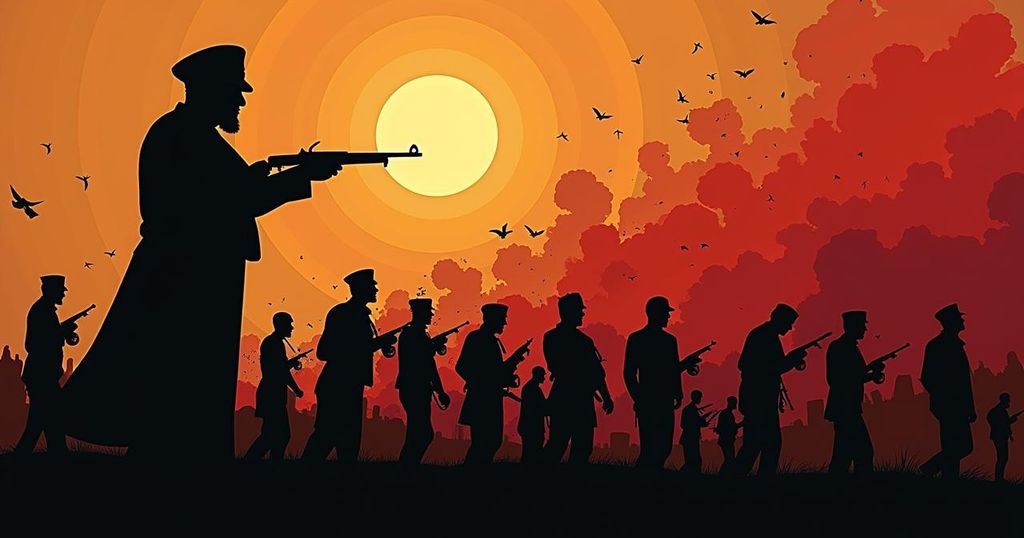The Complex Legacy of Hassan Nasrallah: Leadership, Assassination, and Regional Implications

The assassination of Hezbollah’s leader, Hassan Nasrallah, marks a significant moment, yet echoes past mistakes where such actions did not eliminate threats. He transformed Hezbollah into a major power against Israel but also faced backlash for authoritarian actions. The future of Hezbollah remains uncertain, raising concerns about escalation and stability in Lebanon and the wider region post-assassination.
Hassan Nasrallah’s leadership of Hezbollah was marked by a combination of charisma and military strength, propelling the organization to considerable prominence in Lebanon and the broader Middle East. However, Nasrallah’s assassination raises significant concerns about the implications for stability in the region. The recent history of conflict, particularly the previous assassination of Hezbollah’s leader, has demonstrated that removing key figures does not necessarily dismantle organizations or lead to peace, as both Israel and the United States have learned in the past. Under Nasrallah’s command since 1992, Hezbollah transformed into a formidable adversary for Israel, most notably forcing its withdrawal from southern Lebanon in 2000. Despite some victories, Nasrallah’s leadership had its limitations, often characterized by a blend of strategic successes and problematic affiliations with authoritarian regimes, particularly in Syria. While Nasrallah was viewed as a symbol of resistance and determination by some, his legacy also includes stark criticisms regarding his approach to governance and persistent political violence. The recent military actions taken by Israel to neutralize Nasrallah involved heavy collateral damage, leading to questions about the decision-making processes driving such strategies. The belief that the assassination of leaders can yield lasting change is a pervasive concept among Israeli and American officials, yet the consequences of this logic tend to exacerbate existing conflicts rather than resolve them. Moreover, the dynamics of Hezbollah may shift significantly following Nasrallah’s departure. The organization may refocus on guerrilla tactics, embracing a structure rooted in military action rather than governance, paralleling movements like Kataib Hezbollah in Iraq. This evolution poses a risk of renewed violence and chaos, particularly if a fragmented Lebanon follows in the wake of total war strategies employed by Israel. History suggests that extreme military responses may foster more animosity than stability. In conclusion, while Nasrallah’s elimination may temporarily disrupt Hezbollah’s operations, the broader historical trends indicate that such actions frequently result in chaos and extremism rather than peace. As regional powers continue to recalibrate in response to conflict, the cycle of violence persists, raising concerns for civilians caught in the crossfire and the potential for lasting instability in Lebanon and the surrounding regions.
Hassan Nasrallah has been a pivotal figure in the Middle East, leading Hezbollah since 1992 and effectively challenging Israeli military dominance in Southern Lebanon. His leadership coincided with critical events, including the Israeli military’s withdrawal from Lebanon in 2000, which further entrenched Hezbollah’s influence. However, Nasrallah’s tenure can also be evaluated through the lens of both his charismatic leadership and the criticisms regarding Hezbollah’s operational methods, especially in relation to broader conflicts in the region. The recent decision by Israeli leaders to assassinate him rekindles discussions on the effectiveness of targeting leadership in attempts to neutralize organizations designated as terrorist threats, emphasizing the persistent dilemmas facing Israel and the United States in their foreign policy strategies in the Middle East.
In summary, Hassan Nasrallah’s legacy as a leader of Hezbollah encapsulates both significant achievements and serious critiques. His assassination may not yield the long-term benefits that Israeli and American officials anticipate, as historical precedents indicate that targeting leaders often leads to greater instability rather than resolution. The potential for Hezbollah to adapt and evolve following Nasrallah’s death underscores the complexity of the geopolitical landscape in the Middle East, where violence often begets further violence, complicating the pursuit of genuine peace.
Original Source: foreignpolicy.com








